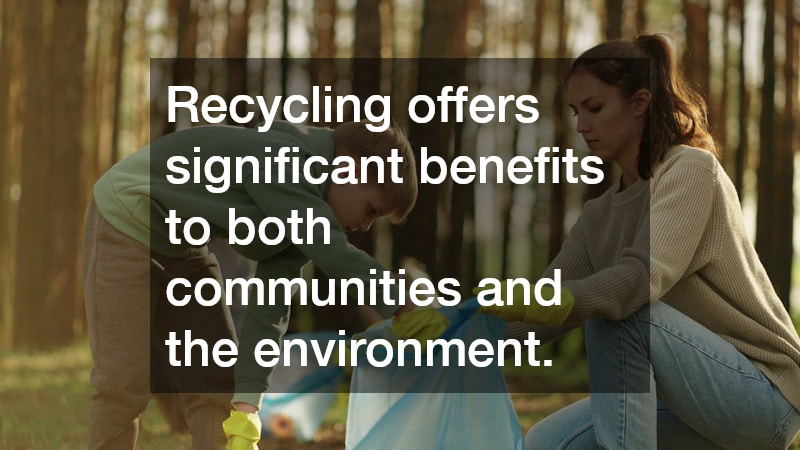Recycling services play a crucial role in how communities manage waste and protect the environment. As populations grow and consumption increases, the need for responsible waste disposal becomes more urgent.
By supporting these programs, communities can reduce landfill use, conserve natural resources and create economic opportunities.
Reducing Landfill Waste & Its Impact
One of the most visible benefits of recycling is the reduction in landfill waste. Landfills take up valuable land space and can lead to soil, water and air pollution when not properly managed. By diverting materials such as paper, plastics and metals from landfill sites, these programs reduce the volume of waste that ends up buried underground.
Less landfill waste also means fewer greenhouse gas emissions, since decomposing waste produces methane, a potent greenhouse gas. Recycling materials like aluminium and glass requires less energy compared to producing new products from raw materials. This reduction in energy use contributes to lower carbon emissions, helping to slow the pace of climate change.
Furthermore, decreasing landfill reliance reduces the risk of leachate contaminating nearby waterways. This toxic liquid can harm aquatic life and disrupt ecosystems. By diverting waste, communities help maintain healthier environments.
Conserving Natural Resources & Energy
Efficient waste management helps conserve finite natural resources by enabling materials to be reused rather than discarded. For example, recycling paper saves trees, while recovering metals reduces the need for mining. Mining activities can have significant environmental impacts including habitat destruction and water pollution, which in turn affect local communities and wildlife. By reducing reliance on mining, we also decrease the energy-intensive processes involved, helping to lower overall environmental degradation.
Using recycled materials often requires less energy than producing goods from virgin resources. For instance, recycled aluminium uses about 95 per cent less energy than creating aluminium from bauxite ore. These energy savings contribute to lower costs and reduced environmental footprints for manufacturers, making products more sustainable and affordable. Additionally, recycling reduces the demand for raw material extraction, which helps preserve natural landscapes and reduces greenhouse gas emissions associated with mining operations.
By conserving resources and energy, responsible waste handling supports more sustainable consumption patterns. This ensures valuable materials remain available for future generations, reducing pressure on ecosystems and biodiversity. Sustainable consumption encourages individuals and businesses to think carefully about their resource use, fostering long-term environmental stewardship and resilience.
Creating Jobs & Economic Opportunities
Beyond environmental benefits, waste recycling creates jobs and economic growth. The recycling industry involves collection, sorting, processing and manufacturing activities that employ thousands of people across Australia. These jobs range from collection truck drivers to skilled technicians in recycling plants, supporting local economies and communities.
Recycling creates a circular economy where waste is transformed into valuable products rather than discarded as rubbish. This process stimulates innovation and new business opportunities, helping local economies thrive. Many small businesses specialise in recycling particular materials, providing specialised services to communities and encouraging entrepreneurship.
Educating Communities & Changing Behaviours
Community education is an essential part of successful waste management. Educational initiatives raise awareness about waste reduction, recycling best practices and environmental responsibility. When people understand how to participate effectively, recycling rates improve significantly, reducing contamination and waste sent to landfills.
Clear information on what can be recycled and how to prepare items for collection helps prevent contamination in recycling bins. Contaminated waste often ends up being sent to landfills, undermining recycling efforts. Community engagement activities such as workshops, school programs and social media campaigns foster a culture of sustainability and shared responsibility among residents.
Changing consumer behaviour through education is one of the most effective ways these programs deliver lasting environmental benefits. When people understand the impact of their waste choices, they become active participants in creating cleaner communities. Over time, this shift in behaviour can lead to broader environmental awareness and a stronger commitment to sustainable living.
Supporting Sustainable Development Goals
Recycling aligns with several United Nations Sustainable Development Goals (SDGs), including responsible consumption and production, climate action and sustainable cities. Improving waste management through effective recycling services and reducing pollution, contributes to healthier environments and a better quality of life.
Australia has committed to these goals and recognises the importance of efficient waste systems in meeting them. Governments implement policies and regulations that encourage recycling services and waste minimisation. Businesses also adopt sustainable practices by incorporating recycled materials into their products and packaging.
The collaborative effort between public, private and community sectors strengthens recycling programs. This cooperation maximises positive outcomes for society and the environment, helping Australia meet its sustainability targets.
Recycling offers significant benefits to both communities and the environment. By reducing landfill waste, and conserving natural resources and energy, it helps protect ecosystems and reduce pollution. Recycling also creates jobs, drives economic growth and supports sustainable development goals.
Educating communities plays a key role in maximising the effectiveness of waste management programs, and fostering responsible behaviours that lead to cleaner neighbourhoods. Supporting and investing in recycling is essential for creating a more sustainable future for Australia.
Through combined efforts, waste recycling can continue to improve management practices and make a meaningful difference in protecting our planet.


